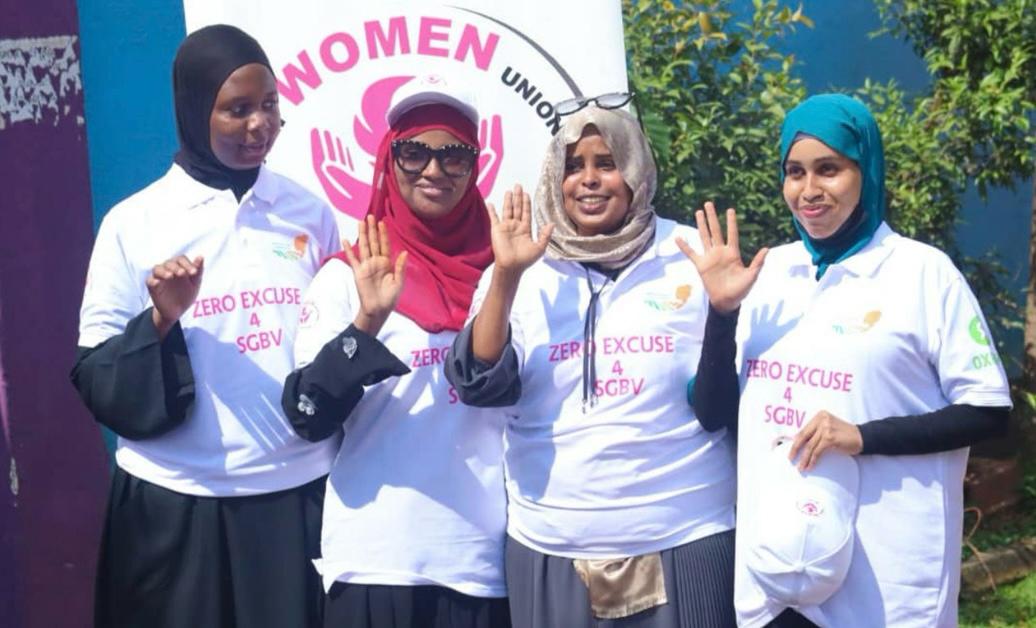In a brightly lit room tucked behind one of Kampala’s busiest streets, 17-year-old Somali refugee Sarah adjusts her hijab with the steadiness of someone who has taught herself to overcome fear. Today, she speaks with the authority of a safeguarding officer—yet her role is shaped by a childhood overshadowed by forced marriage and abuse in Somalia.
Sarah is one of a growing number of refugee women trained through the Refugee Women Network (REWON) with support from Oxfam, funded by the Conrad N. Hilton Foundation, to identify, report, and follow up on cases of sexual and gender-based violence (SGBV) within their communities.
“I was a child. But now, I work so other girls don’t go through what I did,” she said.
Uganda hosts refugees from Somalia, Sudan, South Sudan, and the Democratic Republic of Congo. Many women and girls arrive having survived early marriage, domestic violence, sexual assault, or female genital mutilation (FGM). Yet refugee women say these abuses often continue after they arrive in Uganda, driven by cultural expectations, poverty, and a
lack of systems designed to meet their needs.
For Salma, a young Somali woman, the trauma began at just eight years old, when she underwent FGM—an experience considered “normal” in her hometown. She says REWON’s training opened her eyes to knowledge she was never previously allowed to access.
“I didn’t realise how normalised FGM is. Talking about it was forbidden. Now we talk, and we teach each other,” she said.
Across refugee communities, survivors face deep pressure to remain silent. Aida Musa, a Sudanese community leader, says families often hide cases of rape or domestic abuse to “protect the family image.”
“In our communities, shame is placed on the girl, not the perpetrator. Families tell her to stay quiet,” Aida said.
Survivors may be discouraged from reporting abuse, withdrawn from police processes, or pressured to forgive perpetrators within hours.
Even when survivors choose to report abuse, formal systems can fail them. Francine Ziruka Mwozi, a Congolese advocate in Uganda, recalls a case in which a school hid a perpetrator of harassment to protect its reputation.
“They wanted the family to drop the case,” she said. Mwozi pursued it despite attempts to silence her.
Language barriers, fear of losing documentation, and unfamiliarity with legal systems further discourage refugee women from seeking justice.
According to the Monitoring and Evaluation Officer at the Somali Women’s Union under REWON, Shukri Ali, some police officers reinforce harmful norms.
“Some officers send women back to the abusers. They think it’s just a family matter,” she said.
Economic hardship fuels the crisis. Many refugee men struggle to adapt after losing income and status, creating tension at home.
“When men reach here, the frustration is too much. Some take their anger out on women and children,” Shukri said.
Women who depend financially on partners often feel unable to leave abusive relationships. Others face exploitation from men who offer help in exchange for inappropriate favors.
Early marriage also persists, with some girls married at 17, 15, or younger—cutting short their childhood and exposing them to lifelong harm.
While FGM is illegal in Uganda, it continues underground among some refugee communities. Many families believe it is a religious requirement, despite religious leaders saying otherwise.
“It is cultural, not religious. But culture can be powerful—and dangerous—when misunderstood,” Shukri said.
Despite the challenges, refugee women are driving a quiet but powerful transformation. Through Oxfam-supported REWON trainings, survivors and community leaders are stepping into roles once considered impossible.
Shukri describes the progress with pride: “After training, women speak with confidence. They know their rights. They can fight for themselves and for others.”
Sarah now responds to cases of abuse in Somali households. Salma openly educates others on the dangers of FGM. Aida advocates publicly against early marriage. Mwozi pursues justice even when institutions resist.
REWON’s approach strengthens collaboration among women, men, religious leaders, local authorities, and service providers. By training refugee women to become leaders, the network is breaking cycles of silence and reshaping community norms.
“When one woman succeeds or escapes abuse, it gives me strength. It reminds me why we keep going,” Shukri said.


